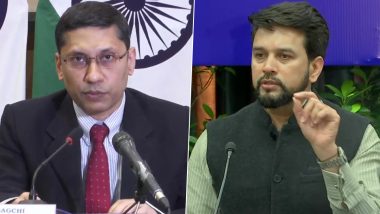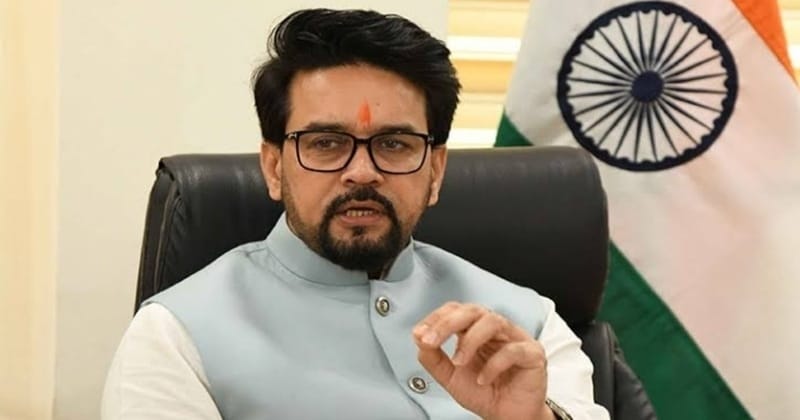Sports Minister Anurag Thakur Takes a Stand: Cancels Visit to China Over Denial of Entry to Arunachal Athletes

Sports Minister Anurag Thakur Takes a Stand: Cancels Visit to China Over Denial of Entry to Arunachal Athletes
In a bold move echoing India’s commitment to safeguarding its interests and maintaining its sovereignty, Sports Minister Anurag Thakur has decided to cancel his visit to China for the 19th Asian Games in Hangzhou. This decision comes in response to China’s controversial denial of entry to athletes hailing from the Indian state of Arunachal Pradesh. The move has stirred diplomatic tensions between the two nations and ignited a debate on the role of sports in international relations.
Arunachal Pradesh, a northeastern state of India, has long been a point of contention between India and China. The two nations have conflicting territorial claims over the region, leading to sporadic border disputes and diplomatic tensions. While the border issue remains unresolved, the denial of entry to Arunachal athletes by China has added another layer of complexity to the ongoing dispute.
The Ministry of External Affairs (MEA) spokesperson, Arindam Bagchi, issued a statement in which he affirmed the Indian government’s commitment to protecting its interests and citizens. “The Government of India reserves the right to take suitable measures to safeguard our interests,” Bagchi stated, hinting at the possibility of diplomatic actions to address the issue.
The cancellation of Anurag Thakur’s visit to the Asian Games is seen as a significant diplomatic signal from India. The Sports Minister was scheduled to represent India and support the country’s athletes participating in the games. However, his decision to abstain from the event underscores the gravity of the situation and sends a clear message to China that India will not tolerate the mistreatment of its citizens, regardless of their place of origin.
The Arunachal Athletes’ Ordeal: Denied Entry to China
The controversy began when a group of athletes from Arunachal Pradesh, India’s northeastern state, was denied entry into China to participate in the 19th Asian Games. The athletes had undergone rigorous training and preparation to represent their nation on an international stage. However, their dreams were shattered when they were refused visas by Chinese authorities.
China’s refusal to grant entry visas to these athletes was met with outrage and condemnation from India’s political leadership, sports community, and the public. Many viewed this act as a blatant violation of the spirit of sportsmanship and a political maneuver to assert China’s territorial claims over Arunachal Pradesh.
Arunachal Pradesh is an integral part of India, and its residents are Indian citizens. The denial of entry to these athletes was not only a direct affront to their aspirations but also a disregard for the principles of inclusivity and fairness that underpin international sporting events like the Asian Games.

Arunachal Pradesh: A Region of Cultural Richness and Diversity
Arunachal Pradesh, often referred to as the “Land of the Dawn-Lit Mountains,” is known for its breathtaking natural beauty, rich cultural heritage, and diverse ethnic communities. It shares its borders with Bhutan to the west, China to the north, and Myanmar to the east, making it strategically significant. The state is home to various indigenous tribes, each with its own unique traditions, languages, and customs.
Despite its remote location and geographical challenges, Arunachal Pradesh has made significant strides in various fields, including sports. The state’s athletes have consistently demonstrated their talent and dedication, making their mark at national and international competitions. Denying them the opportunity to participate in the Asian Games was not only a disservice to these athletes but also a disregard for the principles of fair play and equal representation in the world of sports.
Diplomatic Tensions Escalate: India’s Response
In response to the denial of entry to Arunachal athletes, India has taken a firm stance to protect the dignity and rights of its citizens. Sports Minister Anurag Thakur’s decision to cancel his visit to the Asian Games in China is a clear message that India will not compromise on matters of national pride and sovereignty.
The Ministry of External Affairs (MEA) has also issued a statement highlighting India’s commitment to safeguarding its interests. While the statement did not explicitly mention the specific measures India might take, it underscored India’s resolve to protect its citizens and uphold its principles.
Diplomatic channels between India and China have been activated to address the issue. It is hoped that constructive dialogue will lead to a resolution that ensures the participation of Arunachal athletes in the Asian Games and upholds the principles of equality and non-discrimination.

International Reaction: Support for India
India’s decision to cancel the Sports Minister’s visit to the Asian Games has garnered support from the international community. Several nations have expressed solidarity with India and condemned China’s denial of entry to Arunachal athletes. The incident has raised questions about the role of sports in diplomacy and the need to separate politics from international sporting events.
The International Olympic Committee (IOC) has also been urged to take a stand on the matter and ensure that the principles of fair play and inclusivity are upheld. The IOC’s mission includes promoting a peaceful society through sports, and the denial of entry to athletes based on their place of origin contradicts this mission.
The Role of Sports in Diplomacy
The incident involving the denial of entry to Arunachal athletes highlights the complex interplay between sports and diplomacy. While sports are often viewed as a means of fostering international cooperation and understanding, they can also become a battleground for political disputes.
In recent years, there have been instances where sports events have been used to advance political agendas or make statements on contentious issues. The denial of entry to athletes from Arunachal Pradesh is a stark example of how sports can be entangled in geopolitical disputes.
However, it is important to remember that sports have the potential to transcend political differences and bring nations together. International sporting events provide a platform for athletes from diverse backgrounds to compete on a level playing field, fostering a sense of unity and shared humanity.

The Way Forward: Diplomacy and Sportsmanship
As the diplomatic tensions between India and China continue to simmer, it is essential for both nations to find a peaceful and equitable resolution to the issue of Arunachal athletes’ participation in the Asian Games. Dialogue and diplomacy should be the guiding principles in addressing this matter, ensuring that athletes are not pawns in geopolitical games.
The international community, including organizations like the International Olympic Committee, can play a pivotal role in mediating and facilitating a solution. It is imperative that the principles of fair play, inclusivity, and sportsmanship prevail over political considerations.
In conclusion, Sports Minister Anurag Thakur’s decision to cancel his visit to China over the denial of entry to athletes from Arunachal Pradesh sends a strong message about India’s commitment to safeguarding its interests and the dignity of its citizens.
The incident underscores the intricate relationship between sports and diplomacy and calls for a balanced approach that upholds the principles of inclusivity and equality in international sporting events. As the world watches, it is hoped that dialogue and diplomacy will prevail, ensuring that athletes are not caught in the crossfire of political disputes.




